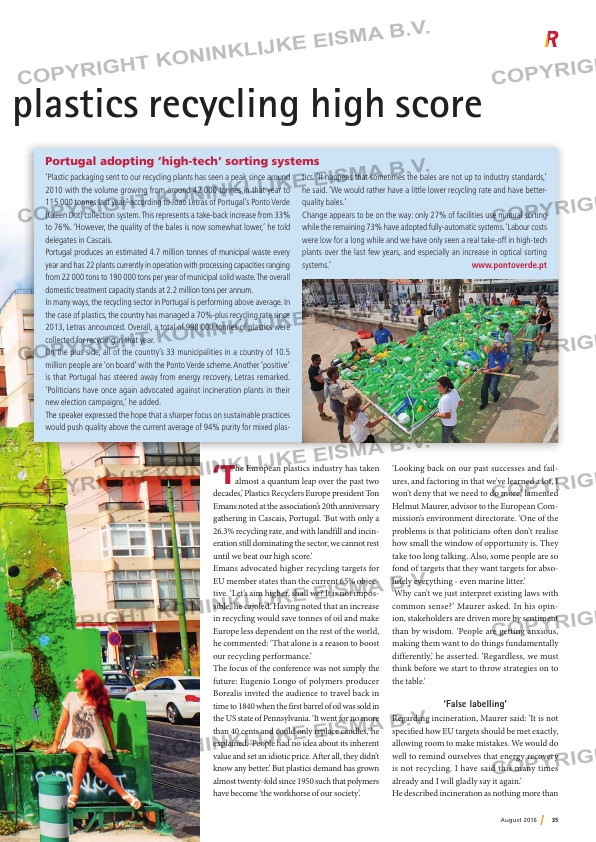Page 35 from: August 2016

35August 2016
‘The European plastics industry has taken almost a quantum leap over the past two
decades,’ Plastics Recyclers Europe president Ton
Emans noted at the association’s 20th anniversary
gathering in Cascais, Portugal. ‘But with only a
26.3% recycling rate, and with landfill and incin-
eration still dominating the sector, we cannot rest
until we beat our high score.’
Emans advocated higher recycling targets for
EU member states than the current 65% objec-
tive. ‘Let’s aim higher, shall we? It is not impos-
sible,’ he cajoled. Having noted that an increase
in recycling would save tonnes of oil and make
Europe less dependent on the rest of the world,
he commented: ‘That alone is a reason to boost
our recycling performance.’
The focus of the conference was not simply the
future: Eugenio Longo of polymers producer
Borealis invited the audience to travel back in
time to 1840 when the first barrel of oil was sold in
the US state of Pennsylvania. ‘It went for no more
than 40 cents and could only replace candles,’ he
explained. ‘People had no idea about its inherent
value and set an idiotic price. After all, they didn’t
know any better.’ But plastics demand has grown
almost twenty-fold since 1950 such that polymers
have become ‘the workhorse of our society’.
‘Looking back on our past successes and fail-
ures, and factoring in that we’ve learned a lot, I
won’t deny that we need to do more,’ lamented
Helmut Maurer, advisor to the European Com-
mission’s environment directorate. ‘One of the
problems is that politicians often don’t realise
how small the window of opportunity is. They
take too long talking. Also, some people are so
fond of targets that they want targets for abso-
lutely everything – even marine litter.’
‘Why can’t we just interpret existing laws with
common sense?’ Maurer asked. In his opin-
ion, stakeholders are driven more by sentiment
than by wisdom. ‘People are getting anxious,
making them want to do things fundamentally
differently,’ he asserted. ‘Regardless, we must
think before we start to throw strategies on to
the table.’
‘False labelling’
Regarding incineration, Maurer said: ‘It is not
specified how EU targets should be met exactly,
allowing room to make mistakes. We would do
well to remind ourselves that energy recovery
is not recycling. I have said this many times
already and I will gladly say it again.’
He described incineration as nothing more than
‘Common sense’ required to beat plastics recycling high score
Portugal adopting ‘high-tech’ sorting systems
‘Plastic packaging sent to our recycling plants has seen a peak since around
2010 with the volume growing from around 42 000 tonnes in that year to
115 000 tonnes last year,’ according to Joao Letras of Portugal’s Ponto Verde
(Green Dot) collection system. This represents a take-back increase from 33%
to 76%. ‘However, the quality of the bales is now somewhat lower,’ he told
delegates in Cascais.
Portugal produces an estimated 4.7 million tonnes of municipal waste every
year and has 22 plants currently in operation with processing capacities ranging
from 22 000 tons to 190 000 tons per year of municipal solid waste. The overall
domestic treatment capacity stands at 2.2 million tons per annum.
In many ways, the recycling sector in Portugal is performing above average. In
the case of plastics, the country has managed a 70%-plus recycling rate since
2013, Letras announced. Overall, a total of 998 000 tonnes of plastics were
collected for recycling in that year.
On the plus side, all of the country’s 33 municipalities in a country of 10.5
million people are ‘on board’ with the Ponto Verde scheme. Another ‘positive’
is that Portugal has steered away from energy recovery, Letras remarked.
‘Politicians have once again advocated against incineration plants in their
new election campaigns,’ he added.
The speaker expressed the hope that a sharper focus on sustainable practices
would push quality above the current average of 94% purity for mixed plas-
tics. ‘It happens that sometimes the bales are not up to industry standards,’
he said. ‘We would rather have a little lower recycling rate and have better-
quality bales.’
Change appears to be on the way: only 27% of facilities use manual sorting
while the remaining 73% have adopted fully-automatic systems. ‘Labour costs
were low for a long while and we have only seen a real take-off in high-tech
plants over the last few years, and especially an increase in optical sorting
systems.’ www.pontoverde.pt



